Skip to comments.
Black U.S. lawmakers try to help Haiti
AP
| 2/26/04
| SONYA ROSS
Posted on 02/26/2004 12:05:32 AM PST by kattracks
WASHINGTON (AP) — The last time democracy fell apart in Haiti, black Democrats launched a very public campaign to get the Clinton administration to return Jean-Bertrand Aristide to power. As Aristide's rule again nears collapse, the same players are stepping up pressure again — only now it's on the Bush administration. And they are using different tactics. Rather than sending protesters into the streets, they're buttonholing top officials and showing up at President Bush's doorstep on short notice to urge that democratic rule be preserved in Haiti.
"This is an urgent moment calling for urgent action," Rep. Elijah Cummings, D-Md., said Wednesday after he notified Bush's top aides that members of the Congressional Black Caucus would pay an impromptu visit to the White House.
It is unclear whether the Democrats will succeed this time.
Bush said Wednesday that the United States was seeking a political solution to the crisis in Haiti, and his administration has made clear it has no desire to send in troops beyond the 50 Marines who arrived there Monday to protect the U.S. Embassy.
The president said he supports creation of an international security presence in Haiti to maintain order if a political settlement is reached.
The United States sent 20,000 troops to Haiti to restore Aristide to power in 1994, three years after Aristide — the country's first democratically elected president — was toppled by a coup. Since then, Aristide has been criticized by the United States for corruption, for rigged 2000 legislative elections and for violence against his political opponents.
On Wednesday, Bush made it clear that Haitians trying to flee to the United States by sea would be turned away.
American blacks contend that policy smacks of racism. They say the United States is unwilling to risk sending soldiers into the chaotic Caribbean nation, the Western Hemisphere's poorest, because its people are of African descent.
When Bush's words reached Jesse Jackson in Libya on Wednesday, he began dialing up members of Congress and administration officials to lash out.
"It is clear that the right wing in this country does not support that democracy," Jackson said in a telephone interview. "(Bush) is, in fact, supporting overthrow of this government in this hemisphere."
On Capitol Hill, 18 black caucus members, plus Rep. Jan Sikorsky, D-Ill., hopped on a bus and went to the White House. Their main demands to Secretary of State Colin Powell and Bush's national security adviser, Condoleezza Rice, were that the United States call for a cease-fire in Haiti, create a humanitarian buffer zone in the capital, Port-au-Prince, and work to keep Haiti from slipping again into the clutches of a dictatorship.
The lawmakers argued that the United States was encouraging the insurgency by refusing to restore humanitarian aid, and they asked the administration to send in troops to protect Haitian officials.
"We cannot have (Aristide's) life taken away on our watch," Rep. Charles Rangel, D-N.Y., said beforehand.
Rice emphasized the administration's hopes for a political framework that could lead to a peace accord. Powell said now was simply not the time for military intervention, even though "we're just as concerned about the loss of human life as you are."
The lawmakers asked for Bush, and Bush joined the meeting. They stressed the need for the humanitarian zone, and Bush said he would think about it.
"He made it very, very clear he shared our concerns. His question was whether he agreed with the solutions," Cummings said afterward.
Earlier this week, a klatch of Democratic senators also sat down with Roger Noriega, the assistant secretary of state who led a delegation to Haiti last weekend. One of them, Bill Nelson of Florida, whose state has a sizable Haitian-American population, said later that the administration's policy seemed designed to drive Aristide out of power.
Jackson said tried to reach Powell before going to Libya, arguing that the United States had a responsibility to stand by Aristide, like it or not.
When he couldn't reach Powell, Jackson said he instead got on the phone with Democratic front-runner John Kerry. Kerry spoke out Tuesday, telling The New York Times that the Bush administration encouraged revolt by cutting off humanitarian aid and adopting an aloof posture toward Aristide.
On Monday night, when Powell returned his call, Jackson urged Powell to engage in shuttle diplomacy between Aristide and opposition leaders, and asked that Bush send U.S. soldiers to protect the president's compound.
Late Wednesday, as the lawmakers' bus pulled away from the White House, the Coast Guard intercepted a boat carrying 22 Haitians off the coast of Miami.
"I can tell you from our visit if they didn't know, they really know now, the importance of an international intervention with the United States playing a leading role," said Rep. Kendrick Meek, D-Fla.
TOPICS: Foreign Affairs; Front Page News; News/Current Events
KEYWORDS: fast; gonaives; guyphilippe; haiti; killed; louisjodelchamblain; marines; metayer; nrlf; rebels
Navigation: use the links below to view more comments.
first previous 1-20, 21-39 last
To: kattracks
On Monday night, when Powell returned his call, Jackson urged Powell to engage in shuttle diplomacy between Aristide and opposition leaders, and asked that Bush send U.S. soldiers to protect the president's compound. Not necessary. There'll be some Haitian solders there within a week or so, maybe in time for an Easter celebration.

21
posted on
02/26/2004 1:36:38 AM PST
by
archy
(Concrete shoes, cyanide, TNT! Done dirt cheap! Neckties, contracts, high voltage...Done dirt cheap!)
To: meenie
I'd like to nominate Maxine Waters for the presidency of Haiti.
To: kattracks; All
Haiti has been the main transhipment point for South American cocaine since the early 1990s.
Follow the money.
23
posted on
02/26/2004 4:14:24 AM PST
by
angkor
To: kcvl
Isn't Aristide an unfrocked priest ?
I read last week that Uncle Sam had sent aid equivalent to $3000 for every man, woman & child in Haiti since Carter-Clinton reinstalled him in 94. Where did it go ? How much made it back to the US as bribes or bank deposits ?
24
posted on
02/26/2004 6:00:28 AM PST
by
1066AD
To: 1066AD
BREAKING NEWS:::
On Sunday, CBS will do a 60 minutes piece on Aristides governance of the Haitian people and the corruption over the last 12 years.
Tonight, World News Tonight will report on the hypocrisy of the black caucus and how they called our government unilateralists in Iraq but now are demanding unilateral action.
Tomorrow, CNN will run a special on Aristide and Clinton and the relationship and financial partnership they and their insider friends shared.
The NY Times and Washington Post will do exposes on the the Aristide presidency and find out what happened to all the money. This will be reported in the Sunday Papers.
After I woke up in a cold sweat I realized that this was all a dream. That things will never change and that the liberal media would just as soon endorse Brezhnev for US president over Bush.
25
posted on
02/26/2004 8:07:03 AM PST
by
EQAndyBuzz
(60 Senate seats changes the world!! Bury Kerry in 04!)
To: beaversmom
That prune-faced old hag wouldn't last 5 minutes in the rough and tumble world of Hatian politics, but the thought is amusing.
26
posted on
02/26/2004 2:33:52 PM PST
by
cabbieguy
("I suppose it will all make sense when we grow up")
To: kcvl
Do you think they are shredding documents in P au P? The Dems are praying to their chthonic deities that they are. This will be like Iraq. Sooner or later, we will be able to follow the money trail.
27
posted on
02/26/2004 8:42:52 PM PST
by
maro
To: maro
HYPOCRITES!!!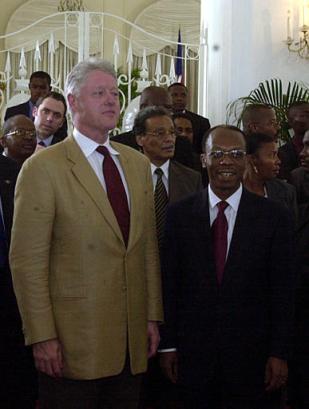
Former President Clinton, left, and Haitian President Jean-Bertrand Aristide pose for photographers, surrounded by Haitian National Palace staff and U.S. secret servicemen in a hall at the Palace, in Port-au-Prince, Haiti,Tuesday, April 8, 2003. Clinton said Tuesday there should be humanitarian exceptions to international agencies withholding aid from impoverished Haiti, which has the highest rate of HIV/AIDS infection in the Caribbean. Haiti was Clinton's last stop in a five-day regional tour focused on efforts against the virus. (AP Photo/Daniel Morel)
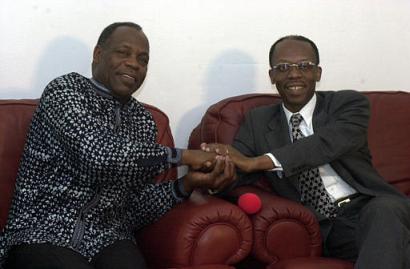
Actor Danny Glover, left, shakes hands with Haitian President Jean-Bertrand Aristide during his visit to the National Palace in Port-au-Prince, Haiti, Wednesday, April 9, 2003. Glover visited Haiti two days after the 200th anniversary of the death of Haitian revolutionary hero Toussaint Louverture and will star in a play about Louverture scheduled to open in Carnegie Hall, New York, later this spring. (AP Photo/Daniel Morel)
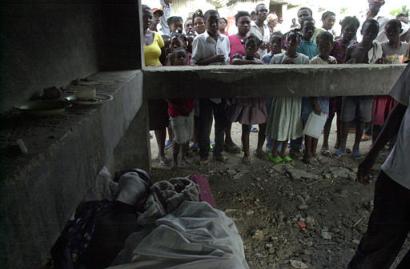
Carrefour residents look at the body of an unidentified homeless man who used to sleep under the local public water reservoir and who died in his make-shift cot a few minutes earlier in the seaside city of Carrefour, Haiti, Tuesday April 15, 2003. Over half the population in the impoverished slums and suburbs surrounding the capital of Port-au-Prince suffer from malnutrition and less than half have access to clean water. (AP Photo/Daniel Morel)
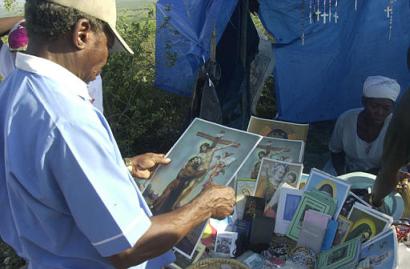
A pilgrim looks at a poster of Jesus on the crucifix being sold by a vendor on the path up the Calvaire Miracle (Miracle Calvary) mountain during the annual Voodoo and Catholic pilgrimage near the border with the Dominican Republic in Ganthier, Haiti, on Friday, April 18, 2003. Every year thousands of people come from all over the country and from abroad to what is believed to be one of Haiti's biggest pilgrimages where devotees climb the steep path and pray at the crosses on their way to the top. (AP Photo/Daniel Morel)

Flag bearers in a Vodou rara band wave a U.S. Confederate flag and a federal flag adorned with a bucking bronco as they lead a Vodou rara band on the highway near Pont Sonde, Haiti, Saturday, April 19, 2002. Rara processions - when Vodou practicioners and others dance, sing and perform rituals along the way - take place during Lent and culminate on Easter Sunday. After over 200 years of persecution and harrassment, the Haitian government officially recognized Vodou as a religion on April 4, 2003. (AP Photo/Daniel Morel)

A girl in Village of Peace, a seaside slum of Port-au-Prince, Haiti, holds the nearly hairless head of a plastic baby doll as she stands in the muddy alley in front of the tin shack she shares with her family on Tuesday, April 22, 2003
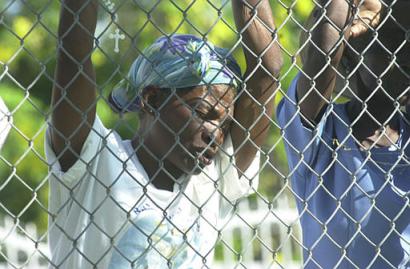
Women who didn't have enough money to buy tickets for the three-day Catholic National Charismatic Rebirth Congress whose theme was 'Why are you afraid, oh ye of little faith?,' and which drew tens of thousands of believers from around the country and abroad, pray outside the chain-link fence surrounding the event in Delmas, Haiti, on Saturday, April 26, 2003. (AP Photo/Daniel Morel)
28
posted on
02/27/2004 11:49:51 AM PST
by
kcvl
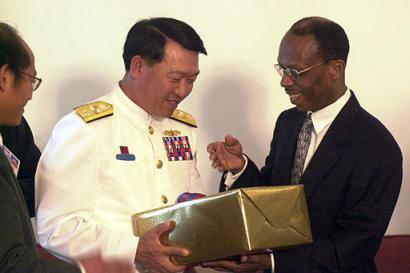
Chi Wang-der, councilor to the Taiwan embassy in Haiti, left, watches as Taiwan's Navy Admiral Chu Tsong-Rong receives a gift from Haitian President Jean-Bertrand Aristide at the National Palace during the visit of a delegation from three Taiwan Navy ships making a two day port call with 800 sailors and midshipmen in Port-au-Prince, Haiti, on Thursday, May 1, 2003. (AP Photo/Daniel Morel)
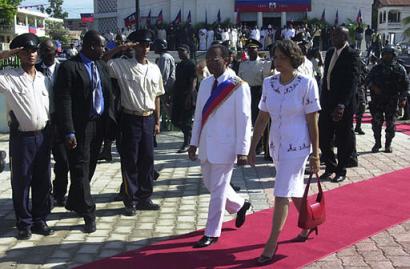
Haitian President Jean-Bertrand Aristide and his wife Mildred Aristide, to his right, walk past saluting police officers as they prepare to raise the Haitian flag in Arcahaie, Haiti, on Haitian Flag Day, Sunday, May 18, 2003. Two hundred years ago in Arcahaie, on May 18, 1803, members of the revolutionary army led by General Jean-Jacques Dessalines ripped the white section out of the French flag and baptized the blue and red Haitian flag during the final months of the slave rebellion. (AP Photo/Daniel Morel)
An unusual memorial service in Haiti. If the dead man, father Antoine Adrien had even limited power, as the Haitians always contend, sure would he repeatedly slap pre-historic totalitarian dictator Jean-Bertrand Aristide for lying to the Haitian people, and extremely so - May 23, 2003
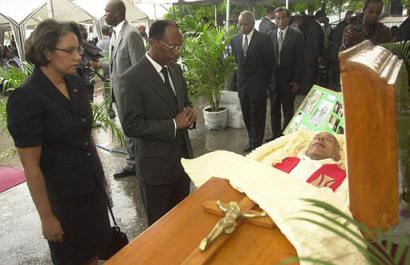
Haitian President Jean-Bertrand Aristide, center, and his wife Mildred Aristide, to his left, pause before the open coffin of Holy Ghost Father Father Father Antoine Adrien, who died at the age of 81 on May 12, as Prime Minister Yvon Neptune, to Aristide's right, and Minister of Foreign Affairs Joseph Philippe Antonio, behind him, approach during a memorial service held for him in the yard of the Petit Seminaire College Saint Martial school in Port-au-Prince, Haiti, on Friday, May 23, 2003. Adrien, whoplayed a key role in Haiti's movement for democracy, was sent into exile in 1969 by dictator Francois Duvalier with the entire Holy Ghost congregation. From 1971 until 1986, he worked to defend the rights of Haitians in the US before returning to Haiti when the Duvalier regime fell. Adrien was a close advisor of Aristide's during the ex-priest's rise to popularity, the presidency, and during the three-year coup d'etat (1991-1994). (AP Photo/Daniel Morel)
29
posted on
02/27/2004 11:58:29 AM PST
by
kcvl
30
posted on
02/27/2004 12:01:47 PM PST
by
kcvl
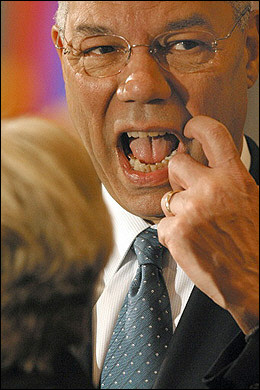
Colin Powell
Repeat after me and do as I order you to by September, tyrant Aristide, "De, de, democracy ... no more dictatorship" - June 9, 2003
31
posted on
02/27/2004 12:06:09 PM PST
by
kcvl
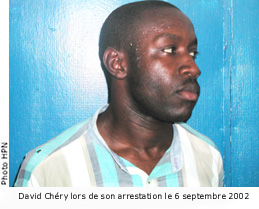
David Cherry, an Aristide's partner in the credit union scheme scam that cost poor Haitians more than U.S.$220 million.
32
posted on
02/27/2004 12:07:33 PM PST
by
kcvl
To: kattracks
Yup the left couldn't drop the bombs fast enough in Kosovo and now they want this marxist thug propped op in Haiti. And there is drug money and other money behind both campaigns. The left is despicable.
To: 2 Kool 2 Be 4-Gotten
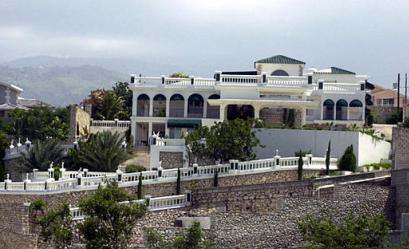
The mansion of accused drug kingpin Haitian Jacques Beaudoin Ketant looks out over a neighborhood in Petion-ville, Haiti, on Friday, June 20, 2003. For six years, Ketant lived the good life, using alleged drug proceeds to buy fancy cars, a mansion and a highbrow education for his children. But a recent brawl at his son's elite private school prompted
Ketant's expulsion to the United States, where was indicted in 1997 on charges of heading a drug network that smuggled cocaine into the United States.(AP Photo/Daniel Morel)
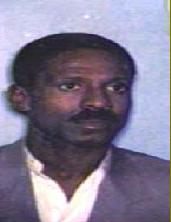
Jacques Beaudouin Ketant, a Haitian drug kingpin, close friend and business partner of Haiti's uncommonly vicious tyrant, hell-sent totalitarian dictator Jean-Bertrand Aristide, taken out of the circulation in tight handcuffs on June 17, 2003, in Haiti, by U.S. Drug Enforcement agents and his mansion, but has since been in a Miami jail cell - June 20-21, 2003
34
posted on
02/27/2004 12:12:07 PM PST
by
kcvl
To: 2 Kool 2 Be 4-Gotten
"Mr. Aristide’s wife Mildred, who calls the shots in Haiti’s shady telecom business, coordinates the national effort to combat AIDS".
Haiti’s Patriotic Movement for National Salvation (MPSN), which hopes that Mr. Aristide’s failed government will soon fold, issued a press release on April 8 impugning Mr. Clinton’s motives. "Did the former American leader invest in important economic sectors and does he feel the need to safeguard his interests in the post-Aristide era," the MPSN asked.
During his one-day visit Mr. Clinton declared, "I think there should be a humanitarian exception to the embargo on aid," according to the Associated Press. A call for funneling large sums of money into any place so notoriously corrupt should raise eyebrows. But this case creates an even greater miasma. Perhaps not coincidentally, Mr. Aristide’s wife Mildred, who calls the shots in Haiti’s shady telecom business, coordinates the national effort to combat AIDS.
Another point of contention for Haitians was Mr. Clinton’s use of the term "embargo" to describe the freeze on aid. It is rhetoric that Mr. Aristide is also fond of but it is inaccurate; an embargo is a prohibition against commerce. Moreover, the freeze could be lifted today if Mr. Aristide would comply with some minimal levels of democratic civility. Unfortunately Mr. Clinton did not mention this.
For ardent defenders of Mr. Aristide such as the Congressional Black Caucus or for Caribbean ambassadors to the U.S. who dislike George W. Bush and have been known to actively support Mr. Clinton’s wife, the plea for more international aid for Haiti might have settled some debts. But for those serious about the Haitian struggle, what appears to be relentless Clinton advocacy for the Aristide presidency is disturbing.
In Part I of his review, on March 13 Mr. Dailey explains what Bill Clinton seems to still not understand. "Aristide’s opponents turned out to be neither the entrenched economic elite nor the die-hard elements of the old Duvalieriste party, as almost everyone in 1994 might have anticipated, but the social democratic-constitutionalist wing of the Lavalas movement, the left-wing-populist coalition that first brought Aristide to power, which was mobilized into opposition by the Aristide government’s increasingly corrupt and authoritarian character."
By now even a zombie would recognize how thoroughly discredited Mr. Aristide is and how critical international pressure is to altering the situation. Which raises the question of why Mr. Clinton doggedly pursues his cozy relationship with the Haitian president.
MARY ANASTASIA O’GRADY
http://216.239.41.104/search?q=cache:mlur1c4XdTkJ:www.haiti-news.com/article.php3%3Fid_article%3D111+aristide,+democrats+telephone+business&hl=en&ie=UTF-8
35
posted on
02/27/2004 12:30:38 PM PST
by
kcvl
To: kattracks
Mr. Kennedy and his mother are both on the board of advisors of the Aristide Foundation for Democracy, a tax-exempt foundation that raises money for Mr. Aritstide’s use in Haiti.
Other foundation board members are Reps. John Conyers (D., Mich.) and Charles Rangel (D., N.Y.).
Haitian Connections
HOW CLINTON’S CRONIES CASHED IN ON FOREIGN POLICY.
29 mai 2001
Ms. O’Grady edits The Americas column
One of the famous foreign policy interventions of the Clinton Presidency was the controversial decision to return Jean Bertrand Aristide to power in Haiti in 1994. This newspaper supported Mr. Clinton, arguing that with U.S. prestige committed and with the restoration of democratic government in the impoverished island as a goal, the President deserved support.
So it is worth revisiting the status of Haiti today, especially to ask how it came to pass that in the wake of this intervention, President Clinton’s political associates--including a former Democratic Party finance chair, a former White House counselor and Joseph P. Kennedy II--ended up in commercial relationships with the Aristide government’s monopoly-owned telephone company.
Since 1994, both as president and later as the power broker behind the presidency of René Preval and the Lavalas Party, Mr. Aristide has ruled Haiti like a mob don. He has extorted the business community, trampled on the 1987 constitution and terrorized his political and economic opponents. Just this past week the Coast Guard sent a ship of 121 Haitian refugees back to the island. Nearly 700 have tried to escape by sea this year.
Haiti’s November 26 Presidential election, in which less than 5% of Haitians voted, was a sham. Five international human rights organizations released a joint statement in January denouncing the election’s violent political climate. Amnesty International called upon the Lavalas Party to condemn acts of intimidation and violence committed in the party’s name. The European Union voted to withhold aid.
In response, the Clinton Administration in January sent Anthony Lake, a former Clinton national security adviser, to Port-au-Prince. He came back with an eight-point agreement in which Mr. Aristide promised better behavior in the future.
The Lake agreement was one free pass too many for Mr. Aristide’s battered opponents (just this past Monday, a house was shot up where opposition leaders were meeting, wounding three). They have grown increasingly eager to tell what they know about Mr. Aristide’s business activities--both now and in Washington during the 1991-94 exile that followed his overthrow by General Raul Cedras.
Regarded as Haiti’s legitimate president at that time, U.S. authorities granted Mr. Aristide access to the country’s frozen assets, most notably the long distance telephone royalties due to Haitian Teleco. According to Christopher Caldwell, writing in the July 1994 American Spectator, Mr. Aristide "raised hackles at the Latin America division of AT&T by ordering the proceeds from Haiti’s international phone traffic moved to a numbered Panamanian account."
In November 1993, The Wall Street Journal reported that Mr. Aristide was paying Democratic Party operative Michael Barnes $55,000 a month to lobby for U.S. action to reinstate him. With the help of U.S. troops, he returned to Haiti. After regaining Haiti’s presidency, the telephone monopoly continued to be useful. Because Haiti is one of the top three markets in the region for long distance calls from the U.S., the monopoly is a cash cow. Mr. Aristide placed loyal Lavalas followers in charge of it, keeping it under his control.
According to the Federal Communications Commission, the most recent officially negotiated settlement rate--the cost Teleco charges U.S. carriers for handling a long distance call in Haiti--is 46 cents a minute. But digital switching allows the company to charge what it wishes and to terminate calls in favor of any long distance carrier that it chooses. Moreover, if long distance carriers use Internet protocols to "bypass" official lines, the FCC cannot count the traffic. Two different long distance suppliers shopping the Haitian market have reported to us that Teleco officials offered them access to the local network at rates well below the official settlement rate in exchange for payment made to specially designated accounts.
Based on telecom settlement processes, a company with privileged access to the network would also receive a high proportion of return traffic from Haiti, also a big money maker. Says one U.S. telecom expert with knowledge of Haiti’s system : "The real sweetheart deals are the ones that have a connection inside Teleco. Those are the deals that make people filthy rich." A U.S. official specializing in international telecom says, "This is exactly what we’ve been seeing in Haiti for years. The money doesn’t go anywhere that leads to a network build-out. Calls get through and someone gets very rich." Despite high rates justified for the purposes of expanding service, the number of phone lines serving the country remains paltry ; most Haitians are relegated to the use of "call centers" to make phone calls. Those centers are now in the hands of Lavalas.
The wide recognition in Haiti that such deals are available has made the presence of independent U.S. long distance provider Fusion Telecommunications International a topic of much discussion among the Haitian business community. Fusion’s board of directors reads like a who’s who of Democratic Party heavyweights.
Fusion’s CEO is Marvin Rosen, who was the finance chairman of the Democratic National Committee during the 1996 Clinton fund-raising scandals. Fusion’s board of directors includes Joseph P. Kennedy II, former Mississippi Governor Raymond Mabus and Bill Clinton’s White House chief of staff and Arkansas confidant Thomas "Mack" McLarty, now with Kissinger McLarty Associates. Mr. McLarty traveled the region as the White House’s Special Envoy to the Americas. The Fusion board also includes Joseph R. Wright, a former director of the Office of Management and Budget under President Reagan. Listed as chairman of the Fusion Advisory Board is former President Bush’s White House Chief of Staff John Sununu. Click here to view a complete listing.
Last fall, when we began to inquire about Fusion’s long distance service to Haiti, the company’s in-house counsel refused to either confirm or deny that it even offered service in that market. Numerous follow-up calls since to her and other members of management were never returned. Mr. McLarty denied any knowledge altogether about Fusion’s involvement in Haiti. Mr. Kennedy did not return our query.
It was only after our Mary O’Grady independently confirmed Fusion’s activity in Haiti and wrote about it for the Americas column that Mr. Kennedy’s office gave us a statement : "Joe has no joint venture, partnership or business arrangement with the president of Haiti or for that matter, anyone in Haiti." The statement also says that Mr. Kennedy is not involved in running Fusion. Mr. Kennedy’s denial is interesting given his February 7 op-ed in the Boston Globe where he wrote on the occasion of Mr. Aristide’s inauguration : "I was proud to help bring more than $1 million in private investment from Fusion into Haiti."
We are not suggesting that Fusion’s business in Haiti is illegal. And we are not so naive as to be shocked at the spectacle of prominent political figures exploiting their former lives as public officials. We are saying that Fusion’s Haiti deal is sleazy. For people connected with the Clinton Presidency-cum-political machine to attach themselves like pilot fish to the bleeding ruin of Haiti under Jean Bertrand Aristide, in the wake of an enormous commitment of American prestige and money on behalf of Haiti’s people, doesn’t survive any conceivable smell test.
It also smells that it is so hard for Fusion’s Clintonites to acknowledge secret business deals with Mr. Aristide, the sole owner and operator of the Haitian economy, who is in power thanks to a U.S. intervention. And yes, we do wonder if this is the tip of yet another Clinton iceberg. The Bush Administration, particularly Colin Powell at State, should be alert to this phenomenon as it revisits the venues of the Clinton foreign policy legacy.
THE AMERICAS
Con Fusion ? Clinton’s Haiti policy deserves prompt scrutiny.
BY MARY ANASTASIA O’GRADY Tuesday, May 29, 2001 12:01 a.m. EDT
(Editor’s note : This column originally appeared in The Wall Street Journal, Jan. 26. ).
Marvin Rosen (finance chairman for the Democratic National Committee from September 1995 until January 1997), former Democratic Rep. Joseph P. Kennedy II and Bill Clinton confidante Thomas (Mack) McClarty III are all on the board of Fusion Telecommunications International, according to that company’s Web site. Mr. Rosen, who was active in the DNC at the height of the Clinton fund-raising scandals, is also the company’s chief executive officer.
Fusion may not be well known in the U.S., but it is a well-known name in the Haitian business community. Although Haiti has never privatized Teleco, the state-owned monopoly, or officially deregulated the country’s telecommunications sector, the government, which has been run by former president Jean Bertrand Aristide’s Lavalas Party since 1994, has granted Fusion a concession in the long-distance market. The terms of the deal are a secret, but sources say Fusion has an office inside Teleco.
Of course there’s nothing illegal about a few heavyweights from the Democratic Party cutting a deal with a foreign government. Nor is it illegal to keep the deal hush-hush. But considering the Clinton administration’s remarkable passivity toward Mr. Aristide’s political terror and corruption over the past seven years, Fusion’s concession is, at the very least, interesting.
It’s not surprising that many Haiti watchers are asking how deep the connections between the Aristide and Clinton political machines really go. There are also hopes among Haiti’s battered democratic opposition that President Bush will have a look at these connections and perhaps reverse a longstanding U.S. policy of not responding effectively to Mr. Aristide’s misdeeds.
Moreover, it should be remembered that American fighting men were employed on Mr. Aristide’s behalf. He was reinstalled as president in 1994 after a U.S. invasion overthrew military coup leader Raoul Cedras. Ever since his return, first as president and then as the power behind the throne during the current presidency of Rene Preval, the Clinton protégé has piled up a dubious record. Economic deterioration, drug trafficking and political assassinations of Lavalas critics have defined Mr. Aristide’s Haiti. Every national election since 1997, including the one last Nov. 7 in which Mr. Aristide claimed victory, has been ruled fraudulent by independent outside observers. Political violence in Port-au-Prince forced the 1999 closing of offices of the International Republican Institute, a U.S. party-affiliated agency that promotes democracy around the world.
The Clinton nonchalance about such matters has puzzled Democrats and Republicans alike. One close observer of U.S.-Haitian affairs said before last fall’s sham elections in Haiti : "I am a Democrat but I have had a hard time understanding it. The administration can have an influence and they’re not doing it. The lengths to which they’re going to are rather remarkable. It is a policy of denying reality."
Unsurprisingly, one theory is that it has to do with Mr. Aristide’s important friendships. There are rumors inside the Haitian telecom industry that Fusion’s concession includes a cost for long-distance minutes substantially below what competitors are offered. If that is false, Fusion could clear it up. But Fusion’s in-house counsel refuses to answer any questions about Haiti, offer the name of anyone at the company who might do so, or return follow-up phone calls. Nor would Mr. McClarty discuss Fusion’s Haiti deal. "Mack doesn’t know anything about Fusion and Haiti," a McClarty spokesman told me. That doesn’t seem to jibe with his listing as a board member.
People with knowledge of the matter say that Fusion in Haiti is a joint venture between Mr. Kennedy and Mr. Aristide. Again, that cannot be confirmed, and Mr. Kennedy was not immediately available for comment. [In a letter published in The Wall Street Journal on March 6, Fusion’s Carol Bain wrote that "Mr. Kennedy does not have any joint venture with Haiti’s President Aristide."] But the Haitian despot, whose Lavalas Party was recently denounced by Amnesty International for threatening in early January to exterminate its opposition, was a guest at Mr. Kennedy’s second wedding, according to press reports. Mr. Kennedy and his mother are both on the board of advisors of the Aristide Foundation for Democracy, a tax-exempt foundation that raises money for Mr. Aritstide’s use in Haiti.
Other foundation board members are Reps. John Conyers (D., Mich.) and Charles Rangel (D., N.Y.). In the June 26, 2000, issue of Insight magazine Catherine Edwards reported that Mr. Conyers had received a letter from a Haitian senator asking him to resign from the foundation. According to Insight, it read : "The incumbent de facto government controls and diverts all the financial resources and power of the Haitian state for the use of the Lavalas political party. The Aristide Foundation is the principal mechanism for diversion of public resources."
Whatever the Fusion deal is, members of the Haitian business community insist that it had to be negotiated through the ruling party and its leader, Mr. Aristide. As one leading Haitian businessman told me, "The telephone concessions are an arbitrary distribution of favors. Anybody who got anything received it through Lavalas. They control the telephone sector. There has been no privatization, no transparency and no legal rules."
During Mr. Aristide’s time as a president-elect in exile, he had access to some $40 to $50 million in frozen Haitian government assets. He drew on those assets at a rate of $900,000 a month during his first year of exile, and $1.8 million a month starting in October 1992, as previously reported in The Wall Street Journal. He also collected millions of dollars in telephone and other royalties due the government of Haiti. This explains how he was able to pay expensive lawyers, with good political connections, to press his case for U.S. aid in returning him to the Haitian presidency. A book written by Lynn Garrison and published in 2000 by Leprechaun Publishing Group claims that Mr. Aristide holds an unpublished manuscript titled "I Paid For My Return."
The Haitian democratic opposition refuses to recognize Mr. Aristide’s November "victory" in the presidential elections and it’s heading for a showdown. This weekend it will convene in several provinces in order to construct an alternative government. During George W.’s "real good scrubbing" of the White House, a close look at conditions in Haiti and what role the previous administration played in upholding a highly unattractive regime would bear a close look.
Ms. O’Grady edits The Americas column, which appears in The Wall Street Journal on Fridays.
Review & outlook : Haitian connections
The Wall Street Journal - US Abstracts ; May 29, 2001
The Clinton presidency made one of its most controversial foreign policy decisions when it intervened to return Jean Bertrand Aristide to power in Haiti in 1994. Since his return, Aristide has run the country like a mob don, terrorizing political and economic opponents, trampling on the country’s constitution and extorting from the business community. One of Mr. Aristide’s biggest source of revenue comes from his control of the country’s telephone monopoly. A key player in the provision of telephone services between the US and Haiti is Fusion Telecommunications, whose board of includes Larry McLarty, a former White House chief of staff. While it is not unusual for former public servants to exploit the experience in private life, the link between Clintonites in Fusion Telecommunications and the Aristide regime does not smell good. The Bush administration should therefore scrutinize with care other areas of Clinton’s foreign policy interventions.
Abstracted from : The Wall St Journal
36
posted on
02/27/2004 12:41:34 PM PST
by
kcvl
To: kcvl
Do you think the telecom business is just a laundry for drug money or a scam in its own right (or a little of both)?
nice info, thanks.
To: 2 Kool 2 Be 4-Gotten
From his “ambassadorial” White House position McLarty was significantly involved in the successful effortsof the U.S. to reinstall Jean Bertrand Aristide as president of Haiti. After Aristide’s return to power, hisgovernment’s telecommunications ministry gave an exclusive contract for international telephone service toFusion Telecommunications International, a company in which McLarty, former DNC finance chairmanMarvin Rosen, former Congressman Joe Kennedy and John Sununu, former White House chief of staff un-der President George H.W. Bush, have significant interests. McLarty is also reported to have been instru-mental in the development of a chain of Latin American auto dealerships owned by his son.
http://216.239.41.104/search?q=cache:NGMHUQZxoA8J:forensic-intelligence.org/MillerInhofeCDC.pdf+aristide,+fusion,+mclarty&hl=en&ie=UTF-8
38
posted on
02/27/2004 12:51:18 PM PST
by
kcvl
To: 2 Kool 2 Be 4-Gotten
Maybe we should just supply handguns and shotguns to Haiti and let those folks figure out their own future. Meanwhile we can drop the boat people off in Venezuela.
39
posted on
02/27/2004 1:16:23 PM PST
by
BobS
Navigation: use the links below to view more comments.
first previous 1-20, 21-39 last
Disclaimer:
Opinions posted on Free Republic are those of the individual
posters and do not necessarily represent the opinion of Free Republic or its
management. All materials posted herein are protected by copyright law and the
exemption for fair use of copyrighted works.
FreeRepublic.com is powered by software copyright 2000-2008 John Robinson















